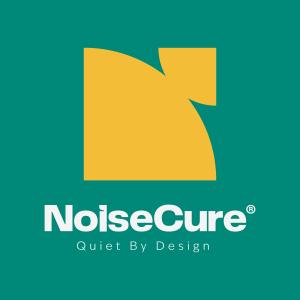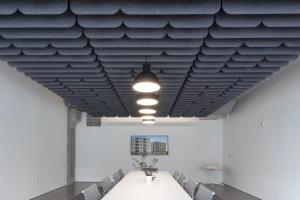Quiet by Design: NoiseCure Brings Purpose-Built Acoustic Solutions
High-Stakes Healthcare Environments Demand Sound Strategies That Work
Noise is one of the most persistent and underestimated challenges in healthcare design. It affects sleep, communication, stress levels, and long-term outcomes — especially in emergency departments, NICUs, patient rooms, and surgical units. NoiseCure™ works alongside healthcare architects, designers, and facility leaders to address this issue head-on.
“In clinical environments, excess noise isn’t just an annoyance — it’s a risk,” said Sara Beth Joyner, CEO at NoiseCure™. “Our goal is to provide acoustic strategies that enhance both function and feeling — spaces that promote clarity, comfort, and care.”
NoiseCure’s solutions are built for healthcare performance — from custom acoustic panels and ceiling treatments that blend seamlessly into interior finishes, to sound-absorbing artwork that serves both aesthetic and functional roles. Every product and plan is thoughtfully developed with healthcare needs in mind, offering options that meet infection control standards, stand up to rigorous use, and comply with industry codes.
By focusing on acoustic performance as a core part of environmental design, NoiseCure™ helps healthcare facilities create calmer, more effective spaces for healing. Whether addressing new construction projects or retrofitting existing buildings, the team brings both design sensitivity and technical expertise to every engagement.
“Hospitals are built for care, but too often they’re filled with noise that disrupts it,” said Andrew White, Project Coordinator. “We’re here to help healthcare organizations reimagine what their spaces sound like — and how that sound affects everyone inside.”
As healthcare systems evolve, so does the need for thoughtful, holistic design. NoiseCure™ exists to bring intention to the one element that’s always present but rarely seen — sound.
About NoiseCure™
NoiseCure™ delivers tailored acoustic solutions for high-stakes environments, with a specialized focus on the healthcare industry. From custom product development to full acoustic strategy, NoiseCure™ blends evidence-based design, aesthetic integration, and technical expertise to reduce noise and elevate experience in the spaces that matter most.
Sara Beth Joyner
NoiseCure™
+1 214-773-1298
email us here
Legal Disclaimer:
EIN Presswire provides this news content "as is" without warranty of any kind. We do not accept any responsibility or liability for the accuracy, content, images, videos, licenses, completeness, legality, or reliability of the information contained in this article. If you have any complaints or copyright issues related to this article, kindly contact the author above.
AI CERTs® Launches AI+ Security Level 3™ to Equip Cyber Pros for Intelligent Threat Defense
Giant Leap Day July 20
Quinn Loggins Releases Heartfelt Tribute “One Year Down” Honoring His Late Father
Kalendarium
Więcej ważnych informacji
 Jedynka Newserii
Jedynka Newserii

 Jedynka Newserii
Jedynka Newserii

Prawo

KE proponuje nowy Fundusz Konkurencyjności. Ma pobudzić inwestycje w strategiczne dla Europy technologie
W środę 16 lipca Komisja Europejska przedstawiła projekt budżetu na lata 2028–2034. Jedna z propozycji zakłada utworzenie Europejskiego Funduszu Konkurencyjności o wartości ponad 400 mld euro, który ma pobudzić inwestycje w technologie strategiczne dla jednolitego rynku. Wśród wspieranych obszarów znalazła się obronność i przestrzeń kosmiczna. Na ten cel ma trafić ponad 130 mld euro, pięciokrotnie więcej niż do tej pory.
Firma
Były prezes PGE: OZE potrzebuje wsparcia magazynów energii. To temat traktowany po macoszemu

Choć udział odnawialnych źródeł energii w miksie energetycznym Polski jest stosunkowo wysoki i rośnie, to ten przyrost jest chaotyczny i nierównomiernie rozłożony miedzy technologiami – wskazuje Forum Energii. Dodatkowo OZE potrzebują wsparcia magazynów energii, a zdaniem Wojciecha Dąbrowskiego, prezesa Fundacji SET, ten temat jest traktowany po macoszemu. Brak magazynów powoduje, że produkcja energii z OZE jest tymczasowo wyłączana, co oznacza marnowanie potencjału tych źródeł.
Infrastruktura
Wzrost wynagrodzeń ekip budowlanych najmocniej wpływa na koszty budowy domu. Zainteresowanie inwestorów mimo to nieznacznie wzrasta

Budowa metra kwadratowego domu w Polsce kosztuje od 5,55 do 6 tys. zł w zależności od województwa – wynika z najnowszych analiz firmy Sekocenbud. Najdrożej jest w Warszawie, gdzie cena za metr kwadratowy domu przekroczyła już 6,2 tys. zł. Na przyrosty kosztów budowy domu wpływają zarówno drożejące materiały budowlane, jak i wyższe wynagrodzenia pracowników. Inwestorzy nie rezygnują jednak z budowy domów jednorodzinnych, co ma związek m.in. z wciąż wysokimi cenami mieszkań czy też obniżką stóp procentowych.
Partner serwisu
Szkolenia

Akademia Newserii
Akademia Newserii to projekt, w ramach którego najlepsi polscy dziennikarze biznesowi, giełdowi oraz lifestylowi, a także szkoleniowcy z wieloletnim doświadczeniem dzielą się swoją wiedzą nt. pracy z mediami.










.gif)

 |
| |
| |
|